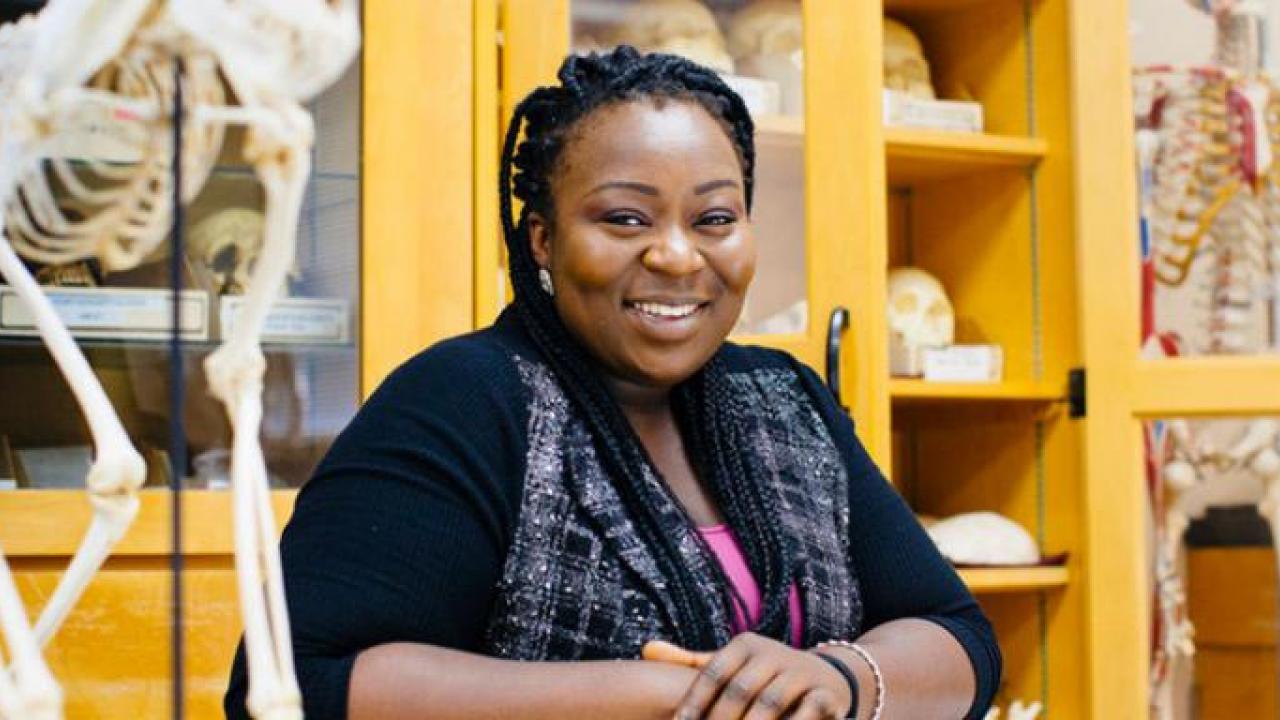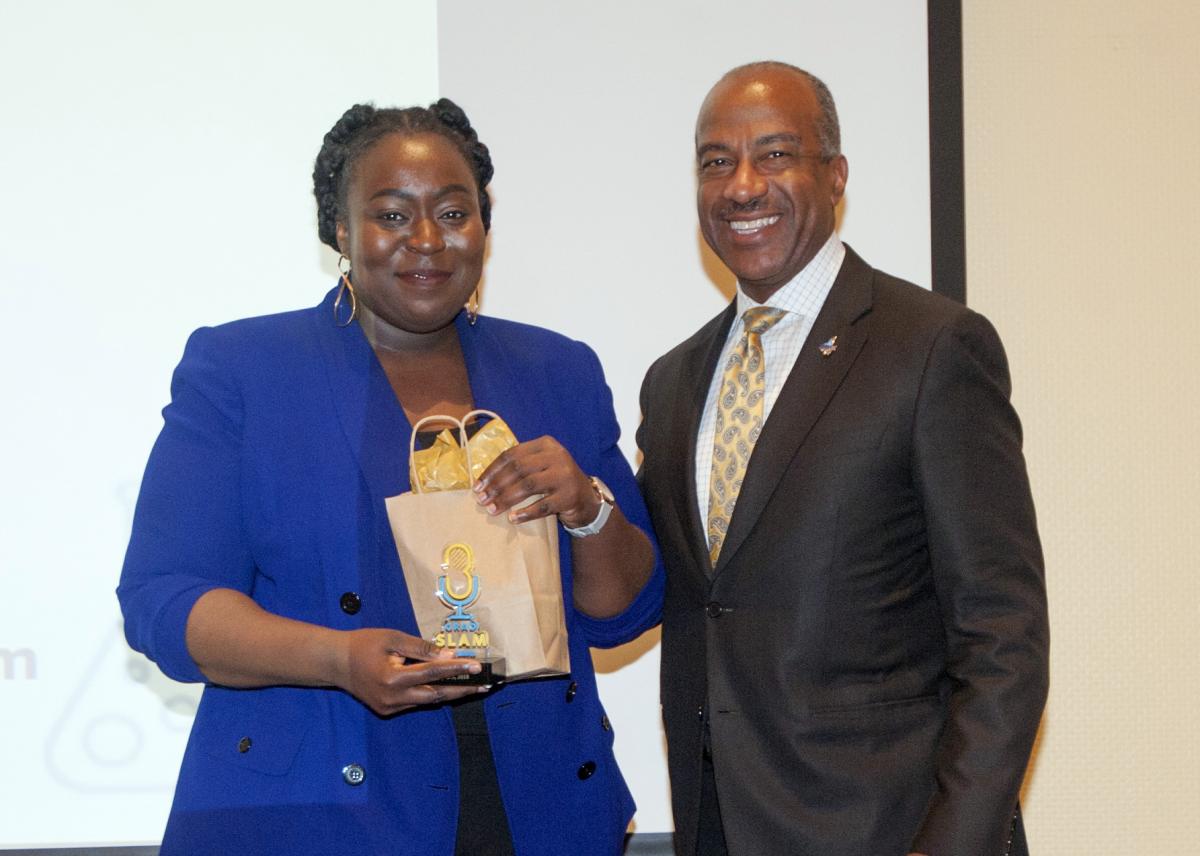
Meet Mayowa Adegboyega, 2018-2019 Graduate Student Assistant to the Dean and Chancellor
Mayowa Adegboyega, Ph.D. candidate in Anthropology, has assumed the role of Graduate Student Assistant to the Dean of Graduate Studies and to the Chancellor (GSADC) for the 2018-2019 academic year.
Mayowa will serve as the primary student representative for graduate students at UC Davis, serving as a voice for graduate student concerns, needs and perspectives. Over the course of a year, she will work closely with Chancellor Gary May, the Interim Vice Provost and Interim Dean of Graduate Studies Jean-Pierre Delplanque, Graduate Council and other campus leaders.
The GSADC frequently meets with graduate students and various graduate student groups and organizations, and provides the opportunity for professional development during which the GSADC may hone their leadership skills while also becoming familiar with university administration, particularly in relation to graduate education.
The GSADC position is a 13-month appointment, starting September 1 and continuing through October 1 of the following year. This position pays a stipend, plus full tuition and fee remission during the position's tenure. The year following service as the GSADC, the student receives a dissertation year fellowship from Graduate Studies.
Adegboyega spent a month shadowing 2017-2018 GSADC Jeanelle Hope on a part-time basis before stepping into the role full-time on October 1.
To learn more about the role of the GSADC at UC Davis, visit the Graduate Student Assistant to the Dean of Graduate Studies & Chancellor website.
 Meet Mayowa Adegboyega, Your New GSADC
Meet Mayowa Adegboyega, Your New GSADC
Tell us a little about yourself and how you became interested in the Graduate Student Assistant to the Dean and Chancellor role.
I am an international student from a family of high achieving, strong and gregarious people from Lagos, Nigeria. I completed my primary and secondary education in Nigeria before I left to attend Howard University, Washington, DC. I earned my degree in Biology in 2014 and in the fall of that year, I began the graduate program in the Anthropology department here at UC Davis where I am currently a fifth year Ph.D. candidate. In addition to my academic pursuits I have served as the President of the Black Graduate and Professional Student Association which serves to provide community and support for Black Identifying graduate and professional students on campus. I have also served my department as a GSA representative and as the President of the Anthropology Graduate Students Association (AGSA).
I have always felt the responsibility to be an active participant in my community and after serving in different organizations on campus, I began searching for a means by which I could better the lives of my peers on a wider scale. I am also interested in peeling back the curtains of campus administration and learning about people and offices that create the resources that we as graduate and postdoctoral students rely on in our academic careers.
What are your research interests? What first interested you in this specific area of study?
I am interested in unraveling the story of human evolution and understanding the fundamental biology that underpins our humanity. For me this involves studying the evolution of human anatomy, more specifically the pelvis. I am fascinated by the pelvis because it is responsible for some critical biological process like childbirth and locomotion and even body heat regulation, and the changes in its shape through evolutionary time can tell us how the body has responded to various environmental and biological pressures. I am also interested in developing new technological approaches to studying these rare, and often damaged fossil pelvises that will allow is to learn more about our ancient relatives.
I discovered the field of paleoanthropology when I participated in the Evolution and Ecology Graduate Admissions Pathways (EEGAP) program which is one of the UC-HBCU Initiative program here at UC Davis. For my summer project, I studied the evolution of the vertebral column of different species of fish and this eventually led me to want to understand such processes in humans. I eventually settled on studying the pelvis because of its complexity, importance, and its relative elusiveness in the fossil record. It became this enigma that I wanted to unravel.
Before coming to UC Davis as a graduate student, you participated in the UC-HBCU program. How did your experience as a summer research intern impact you and your academic and professional goals?
Before I participated in the UC-HBCU Initiative program, I was like many Biology undergraduate students, on a medical school track. This was mostly driven by a need to help people, but also partially because it was the field I knew the most about as a career option. However, the UC-HBCU program allowed me to experience life as a researcher in a very holistic way and it introduced me to morphological studies and also spurred my interest in fossils and human evolution. I can honestly say that nearly every professional goal I had from that point forward was shaped by my experiences that summer.
Chancellor May is in the process of developing a new strategic plan for the campus, which is due to be released in the coming months. What priorities and initiatives do you hope are included? (Editor's note: UC Davis’ strategic plan, “To Boldly Go,” was released while this story was in production.)
I hope Chancellor May’s strategic plan includes investing in broader and more dynamic career development initiatives and industry partnerships not only in STEM fields, but also in the Social sciences and Humanities. I also hope the Chancellor’s initiatives include immediate and long-term solutions to easing the housing costs and availability in Davis.
What are the biggest challenges facing current graduate and professional students? What can graduate programs do to help?
A lot of the challenges facing graduate and professional students are related to the expenses and resources that we need to survive such as housing, transportation, food insecurity, childcare resources, and moving costs for incoming students. Professionally, student would benefit from increased guidance on transitioning into the workforce whether it be academia, industry or elsewhere. Graduate programs and advisors should better familiarize themselves with the resources that UC Davis provides to assist students in these areas from the emergency loan programs to the many professional development resources on campus.
You won the People’s Choice Award in this year’s UC Davis Grad Slam competition. How can graduate students develop the skills needed to clearly communicate the importance of their research to a public audience?

Events like the Grad Slam are a wonderful way of honing our presentation skills and I encourage everyone to participate at least once. Student should also look into developing and participating in outreach programs on a graduate program level. I can say from experience that having to explain complex, jargon heavy ideas to first graders really forces you to be creative and engaging.
What roles and activities prepared you for the GSADC position?
As president of the Anthropology Graduate Student’s Association at UC Davis, one of my goals has been to facilitate open dialogue between students from different backgrounds through social activities and discussion groups that enable rich discussions of issues in and out of academia that affect us in different ways. My other major pursuit has been to continue to grow our K-12 Outreach program which aims to familiarize students in the greater Sacramento area with higher education in general and Anthropology specifically. We organize museum tours, presentations and workshops on various topics and in collaboration with the Early Academic Outreach Program Office at UC Davis, we are hoping to reach even more underrepresented minority students.
As the first recipient of the UC-HBCU Initiative Fellowship at UC Davis, I consider myself an ambassador for diversity initiatives at the University of California. I have worked closely with the department of Graduate Studies both as a volunteer, and as an employee, to improve the recruitment and retention of black scholars in our graduate schools. I have mentored over 50 summer UC-HBCU fellows, many of which have gone on to graduate school at the UCs and elsewhere.
As the president of the UC Davis Black Graduate and Professional Students Association, along with other events that I am proud of, I co-founded the now popular Black Space event on campus which allows black graduate students to meet up for 2 hours weekly to strengthen our community, and help each other achieve our professional goals.
What do you hope to accomplish in this role? Are there any major projects you hope to launch?
I am excited to work with Chancellor May and the graduate student community this academic year and I hope together, we can come up with creative solutions to 1) improve of housing and transportation options for graduate, professional, and postdoctoral students, 2) foster intentional inclusivity in our graduate programs and 3) investing in more dynamic career development resources and initiatives.
If you could go back in time and give yourself advice for your first year of graduate school, what would you say?
I would tell myself to give myself a break. That there is an adjustment period to graduate school and it is OK not to feel completely sure of myself and of the future.
Name a few UC Davis graduate students, faculty, or postdocs who inspire you.
Tim Weaver, Teresa Steele, Paleogroup, Carole Hom, (2017-2018 GSADC) Jeanelle Hope.
Where do you see yourself in ten years?
I hope to have secured a tenure-track position, however I am also interested in helping to develop anthropological research programs and initiatives in my home country of Nigeria to provide students with the same opportunities that I have had the privilege to enjoy without having to leave the country.
About Graduate Studies at UC Davis
Graduate Studies at UC Davis includes 99 dynamic degree programs and a diverse and interactive student body from around the world. Known for our state-of-the-art research facilities, productive laboratories and progressive spirit – UC Davis offers collaborative and interdisciplinary curricula through graduate groups and designated emphasis options – bringing students and faculty of different academic disciplines together to address real-world challenges.
UC Davis graduate students and postdoctoral scholars become leaders in their fields – researchers, teachers, politicians, mentors and entrepreneurs. They go on to guide, define and impact change within our global community.
For information on Graduate Studies’ current strategic initiatives, visit the Graduate Studies strategic plan page.
